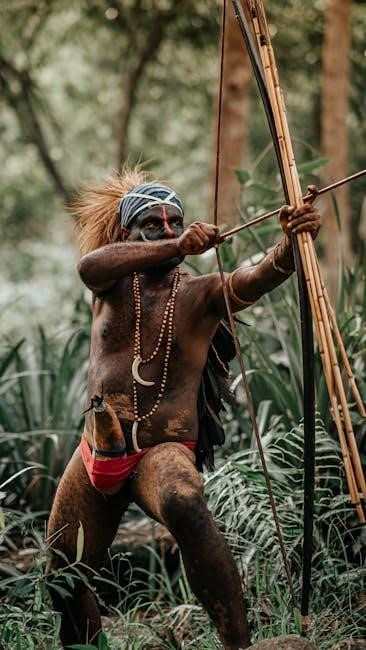Becoming a hunting guide requires a deep passion for the outdoors, strong skills, and detailed knowledge of wildlife and habitats. It demands dedication to ensuring safe, ethical, and successful hunting experiences for clients.
1.1 Understanding the Role of a Hunting Guide
A hunting guide serves as an expert leader, ensuring safe and successful hunting experiences for clients. The role requires extensive knowledge of wildlife behavior, habitats, and hunting regulations. Guides must be skilled in tracking, navigation, and outdoor survival, while also maintaining a focus on ethics and conservation. They are responsible for planning trips, selecting optimal locations, and providing instruction on hunting techniques. Building trust and rapport with clients is crucial, as guides must cater to varying skill levels and preferences. The role also involves ensuring compliance with legal requirements and promoting responsible hunting practices. A guide’s success lies in delivering memorable adventures while prioritizing safety, sustainability, and client satisfaction.
1.2 Importance of Passion and Dedication
Passion and dedication are the cornerstone of a successful hunting guide career. A genuine love for the outdoors and wildlife drives guides to excel in their role. Dedication ensures they stay committed to continuous learning and improvement. Guides must be willing to invest time in understanding wildlife patterns, terrain, and hunting laws. Passion fosters a deeper connection with clients, creating meaningful experiences. Dedication also helps guides adapt to challenging conditions and unexpected situations. Without these qualities, the demands of the job, such as long hours and physical challenges, can become overwhelming. Ultimately, passion and dedication ensure guides provide exceptional service and uphold the integrity of the sport, making them invaluable to their clients and the hunting community.
Essential Skills and Knowledge
Essential skills include in-depth knowledge of hunting licenses, wildlife behavior, and habitat management. Proficiency in safety protocols and outdoor navigation is crucial for ensuring successful and ethical hunting experiences.
2.1 Physical and Mental Requirements
Becoming a hunting guide demands physical stamina to handle long walks, carry gear, and endure harsh weather. Mental toughness is equally crucial, as guides must remain calm under pressure and make quick decisions. The ability to navigate challenging terrain, track wildlife, and ensure client safety requires both endurance and focus. Additionally, guides need patience and strong communication skills to guide clients effectively. The role also requires a keen sense of awareness and the ability to adapt to unpredictable situations, making it essential to be in top physical condition and possess a resilient mindset.
2.2 Wildlife and Habitat Knowledge

Understanding wildlife behavior, habitat preferences, and migration patterns is essential for a hunting guide. This knowledge helps in tracking game effectively and predicting their movements. Guides must also be familiar with the local ecosystem, including vegetation, water sources, and terrain features, to locate hunting grounds successfully. Additionally, recognizing animal tracks, signs, and calls enhances the ability to connect clients with their targets. Staying updated on seasonal changes and how weather influences wildlife activity is crucial. This expertise ensures that guides can lead safe and productive hunting experiences while respecting the environment and wildlife. Continuous learning and hands-on experience are key to mastering these skills.
2.3 Familiarity with Hunting Laws and Regulations
Understanding and adhering to hunting laws and regulations is crucial for a hunting guide. This includes knowing licenses, permits, and seasonal restrictions. Guides must ensure compliance with local, state, and federal regulations to avoid legal issues. Staying informed about bag limits, weapon restrictions, and protected areas is essential. Additionally, guides should promote ethical hunting practices and respect wildlife conservation efforts. Familiarity with laws ensures safe and responsible hunting experiences, protecting both clients and the environment. Continuous updates on regulation changes are necessary to maintain compliance and uphold the integrity of the profession. This knowledge is vital for building trust and ensuring sustainable hunting practices.

Licensing and Certifications
Licensing and certifications are essential for legitimacy and safety. Obtain necessary hunting licenses, first aid certifications, and consider liability insurance to protect yourself and clients.
3.1 Obtaining Necessary Hunting Licenses
Obtaining the right licenses is a critical step to become a hunting guide. Research the specific permits required for your region and ensure compliance with local regulations. Many states mandate guide-specific licenses, which may demand proof of experience and completion of a hunter education course. Applications often involve submitting documents, such as proof of residency, and paying associated fees. Stay informed about seasonal restrictions and license renewal timelines to maintain legal compliance. Licensing ensures you operate ethically and professionally, protecting both you and your clients. Always verify requirements with your state’s wildlife agency to avoid legal issues.
3.2 First Aid and Safety Certifications
First aid and safety certifications are essential for hunting guides to ensure client safety and preparedness in remote environments. Consider obtaining Wilderness First Aid (WFA) or Wilderness Emergency Medical Technician (WEMT) certifications, which cover injury assessment, wound management, and evacuation procedures. Additionally, a CPR certification is crucial for handling cardiac emergencies. Many programs also include training in survival skills, navigation, and hazard assessment. These certifications not only enhance your credibility but also equip you to handle emergencies confidently. Regular recertification ensures your skills remain up-to-date. Prioritizing safety through proper training protects both you and your clients, fostering trust and ensuring successful hunting experiences. Always check local requirements, as some regions may mandate specific certifications for guides.

Gaining Practical Experience
Gaining practical experience is crucial for becoming a skilled hunting guide. Start with apprenticeships under experienced guides to learn hands-on skills and build a portfolio of successful hunting adventures.
4.1 Apprenticeships and Mentorship
Apprenticeships and mentorship are vital for gaining hands-on experience as a hunting guide. Working under experienced guides allows you to learn essential field skills, such as tracking, navigation, and wildlife behavior. Mentorship provides guidance on managing clients, ensuring safety, and adhering to ethical hunting practices. These opportunities also help you understand the logistical aspects of organizing hunts, such as planning routes and setting up camps. Building a strong relationship with mentors can open doors to valuable networking opportunities and help you develop a reputation as a reliable and skilled guide. Apprenticeships are a cornerstone for transitioning from a novice to a confident, capable hunting guide.
4.2 Building a Portfolio of Hunting Adventures
Building a portfolio of hunting adventures is essential for showcasing your expertise and attracting clients. Document your experiences through photos, testimonials, and detailed stories of successful hunts. Highlight diverse environments and game species to demonstrate versatility. Include challenges faced and how you overcame them, illustrating problem-solving skills. A well-curated portfolio, presented professionally online or in print, helps establish credibility. Share your portfolio on websites, social media, or through client referrals to maximize visibility. Regularly update it with new adventures to reflect your growth as a guide. This visual and narrative record not only attracts clients but also serves as a marketing tool, proving your capability to lead memorable and safe hunting experiences.

Marketing and Business Skills
Mastering marketing and business skills is crucial for attracting clients and building a successful guiding business. Develop a strong brand, manage finances effectively, and network strategically to grow your client base.
5.1 Creating a Professional Online Presence
Establishing a strong online presence is vital for attracting clients. Start by creating a professional website showcasing your expertise, services, and testimonials. Ensure it is mobile-friendly and includes essential pages like “About Me,” “Services,” and “Contact Us.” Utilize search engine optimization (SEO) techniques to improve visibility, incorporating relevant keywords such as “hunting guide” or “wildlife expertise.”
Leverage social media platforms like Instagram, Facebook, and YouTube to share engaging content, such as hunting tips, behind-the-scenes insights, and client success stories. Consistent branding across all platforms helps build recognition and trust.
Consider writing a blog to share knowledge and experiences, enhancing your credibility. Encourage client reviews and testimonials to boost your reputation. Explore email marketing to keep potential clients informed and engaged.
Finally, invest in professional tools or templates to streamline your online efforts, ensuring your digital presence effectively promotes your guiding services and attracts a loyal client base.
5.2 Attracting Clients and Promoting Services
Attracting clients requires a strategic approach to marketing and building relationships. Develop a unique selling proposition (USP) that highlights your expertise, such as specializing in a specific type of hunt or location. Use social media platforms to share engaging content like hunting tips, success stories, and behind-the-scenes glimpses of your adventures.
Collaborate with outdoor gear companies or local businesses to cross-promote services. Attend hunting expos, workshops, and community events to network and showcase your guide services. Offer referral incentives to satisfied clients to encourage word-of-mouth marketing.
Create a portfolio or blog featuring your hunting experiences and client testimonials. Utilize email marketing campaigns to keep potential clients informed about upcoming trips and special offers.
Invest in targeted advertising, such as Google Ads or Facebook ads, to reach hunters actively searching for guides. Ensure your promotional materials emphasize safety, professionalism, and unforgettable experiences to build trust and attract loyal clients.
Becoming a successful hunting guide is a rewarding journey that requires passion, knowledge, and dedication. By mastering essential skills, obtaining proper certifications, and gaining hands-on experience, you can build a reputable career in this field.
Remember, the key to attracting and retaining clients lies in providing safe, ethical, and memorable hunting experiences. Stay committed to continuous learning and adaptation to ensure long-term success.
Ultimately, a hunting guide’s role is not just about leading hunts but also about sharing knowledge, fostering connections with nature, and creating lasting memories for clients. Pursue this path with integrity and enthusiasm, and you’ll find a fulfilling career in the great outdoors.